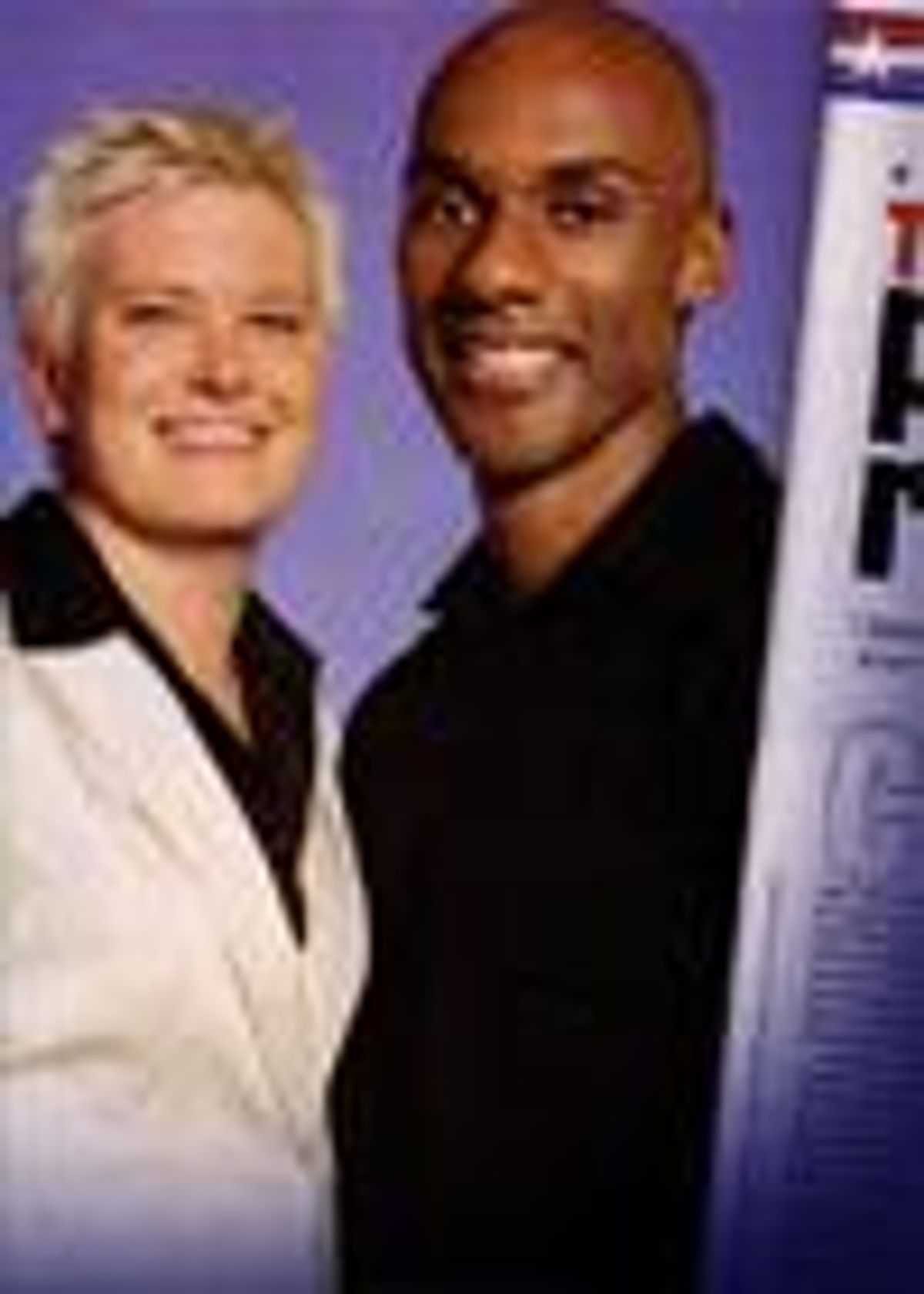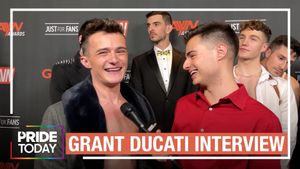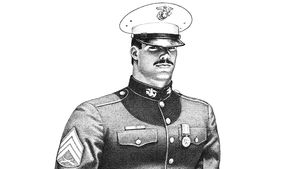Chrissy Gephardt
and Keith Boykin got along so smashingly at a recent
press event in Los Angeles that it was easy to forget they
are fierce competitors. The two out gay activists and
eight other contestants are fighting for the grand
prize of $200,000 and the unofficial title of
"president" of the United States on
Showtime's new reality series American
Candidate. The winner also gets to address the
country in a prime-time "acceptance"
speech when the show concludes in October.
American Candidate, which debuted August 1, is
part civics lesson, part Survivor, as six men
and four women with very different backgrounds face off
against each other in a series of campaign challenges,
such as producing their own television advertisement
and organizing a rally. They are aided by real-life
politicos, and at the end of each episode a contestant is
voted "off the ballot." In the final two
episodes viewers will choose the winner, a la
American Idol. Props should go out to the
cable channel for reserving spots in the cast for an
openly gay man and a lesbian.
Gephardt, 31, is a Washington, D.C., political
consultant and daughter of U.S. House of
Representatives minority leader Richard Gephardt of
Missouri. Boykin, 38, is a former adviser to President Bill
Clinton and current president of the newly formed gay
rights group National Black Justice Coalition. Other
cast members include an avid gun rights enthusiast
living in Utah and a retired Air Force nurse from Missouri.
Showtime has placed its bets on American
Candidate because the American electorate is extremely
polarized and attentive to anything political at the
moment--even if it is a fictional reality show.
Gephardt and Boykin both say they probably
wouldn't run for the real presidency because
candidates are placed in fishbowls and every detail of
their lives are picked apart. However, the 2004
Bush-Kerry race is never far from their minds. Like most
politically active gay men and lesbians, they are pained by
the attempts by George W. Bush and the Republican
Party to gay-bait voters. Meanwhile, they are not
pleased that Democratic presidential nominee John Kerry does
not support marriage rights for same-sex couples.
The Advocate sat down with Gephardt and Boykin
to get a peek inside the show and their take on the real
2004 presidential race. [Note: As this issue went
to press, Gephardt was eliminated in the first
episode of Candidate. --Ed.]
Why do you think Showtime was convinced that a
reality show about politics would work? Isn't
this the kind of topic that could easily get
bogged down in Washington, D.C.-type speak?
Gephardt: They put an entertainment factor in
it--sort of like a Survivor-type
elimination process, and it combines entertainment and
politics. If it was just politics, it would be CNN or
C-SPAN. They've made it interesting with
character development, which makes for a good story.
We're more than just candidates; they do a bio on us
and talk about who we are as people. The audience
becomes engaged by our life stories.
What should viewers take away from this show?
Boykin: I think we need to see more diversity
in our government, and I think it's only going to
happen with ordinary people who step up and start
saying something and getting involved in politics. A
lot of the time we look at politics and we look at the
major party candidates and we get the impression that you
have to be a rich straight white millionaire.
Chrissy, I imagine in campaigning with your father
in the past you've seen your fair share of real
politics. How close is the show to that reality?
Gephardt: Some of the events are similar to
what a real campaign would go through. A lot of it
isn't real just because of logistical reasons.
And obviously the way candidates are eliminated is not
real. It's impossible to have a re-creation of a
real campaign, but the advice we got from the different
strategists on message and how to run our campaigns
was similar.
Keith, how did working with Bill Clinton prepare you?
Boykin: That experience was very helpful in
terms of knowing what it takes to be a good president and
knowing what issues are important to the American
people and how to communicate the two.
I think one of the things that I learned from
politics is that you really have to open up your life
and live in a fishbowl to be an elected official.
It's always something I've been a little
uncomfortable with. But I think the show will provide an
opportunity to see what it's like to live in a
fishbowl, because we have cameras following us around
all the time. I have no idea what it's going to
look like on TV.
Each candidate gets to pick a platform. What are
each of yours?
Boykin: I focus on jobs, health care, education, home
ownership--which may be really critical to building a
stronger country. Those are issues that transcend
identity. People need them whether they're
straight or gay, black or white. I've tried to
have a message that appeals to everyone, and I want to
continue doing that in my campaign.
Gephardt: My platform is investing in people by
enriching our communities, investing in health care and
education, and putting the priorities on people first
in this country. For so long our priorities have been
skewed to things that are not helping people. I think
that's why people feel disenfranchised and why they
don't feel like they have a part in politics.
Do your platforms address gay issues?
Boykin: My platform also includes support for
LGBT issues, including the Employment Non-Discrimination
Act, marriage equality, gays in the military, and
hate-crimes protection. I want my campaign to show
that gays and lesbians are not one-dimensional. I
chose my life partner as my campaign manager so that
everyone could see that we're a couple but also
see that we're concerned about the same issues
that concern other Americans.
Gephardt: Equality is part of my
platform--equality for all people, which encompasses
more than just LGBT equality, but equality in terms of
equal access to health care and education, equal
opportunities for advancement in college and in careers.
Will there ever be a woman or an African-American
or a GLBT president in our lifetime?
Gephardt: I think we'll see a woman
president. We've seen a lot of women leaders in
politics in the U.S. Senate. I think that people are
more and more accepting of the role of women in
positions of leadership, whether it be in the business world
or the political. It's just a matter of time.
Boykin: I think there are a lot of strong
African-American candidates out there who could be
president--look at people like Colin Powell.
There are other stars, such as [Illinois U.S. Senate
candidate] Barack Obama and [Tennessee Democratic
congressman] Harold Ford Jr. There are a lot of people out
there who have the potential to be able to unite the
country and get active.
I think we need to get more GLBT people to run
for local, state, and other federal offices so we can
build up a sense of possibilities for the presidency.
Right now, even gay people can't conceive of a gay
president. But if you have gay senators and gay governors
and gay representatives, that perception will change.
How important is the current real-life presidential
race for GLBT voters?
Gephardt: We must get our troops out and vote,
and if we don't, then shame on us. If Bush is
reelected, then our rights are on the line.
That's why it's imperative that we go
and vote.
Boykin: After a while, activists start to sound
like broken records, because we say that this is the most
important election in our lifetime or in history.
Truth is, it is, but so is every election. But this
year we have a choice between two candidates who are
completely different. One candidate wants to amend the
Constitution to discriminate against gays and
lesbians. The other candidate only wants to amend the
[Massachusetts] state constitution [laughs]. If Bush
is reelected, we can count on more gay wedge issues,
emphasis on the constitutional amendment to ban
marriage, and rhetoric about the "traditional"
family. There will be more Supreme Court justices and
federal judges who will roll the clock back on gay rights.
Why does it seem that voters, particularly gay and
lesbian youth, are so apathetic toward politics?
Boykin: I think young people in general are not
involved in politics because politicians aren't
saying things that interest them.
I used to teach political science at American
University in Washington, and I'd always ask my
students if they thought the issues politicians were
raising affected them, and they almost unilaterally said
no. That was even more true in the year 2000 when candidates
were talking about Medicare and Social Security.
Young people have enormous power in the process.
It only takes a few percentage points to influence an
election. In the last election, if 537 LGBT youths had
voted for Al Gore [in Florida], that would have saved the
entire outcome. Just think how much power people have if we
use that power. But so many people have become disenfranchised.
Gephardt: I feel that people see that a lot of
politicians are controlled by special interest money, and
they realize that no matter what they do, even if they
vote, that there's a lot they can't
control. I think it's that feeling of hopelessness.
I think a large segment of the gay and lesbian
population is fairly apathetic. But I think
there's also a larger number that have been
involved lately because of the whole gay marriage debate.
I'm seeing more and more people becoming
involved in the process because of that. But I think
we still have a long way to go.
Any thoughts on what it takes to get people to the polls?Gephardt: I think shows like this will help. I
also think talking to gays and lesbians about why this
election will personally impact their lives [is
important]. One of the things that we often
see--particularly in some of the political circles or
some of the people I've interacted
with--is that they say, "I'm fine;
I don't see why this is such a big deal. I
don't necessarily want to get married. Why does this
impact me?" And my argument is, "You may
be fine if you have enough money to hire a lawyer to
make up a legal document so that you get all your
partner's assets if he were to die. But think of all
the people out there who don't have the money
or means to do that."
We should be fighting for those people in this
country. We should be fighting for other gay and
lesbian families who don't have the same access
and privileges that we do. A lot of people don't
think it will affect them, but we just have to show
them real examples and real stories of people's
lives in which they've been affected.
I'm sure all of us can recount a story of a gay or
lesbian family that wasn't able to adopt or
whose children were taken away. Those are the stories
we need to tell people. That is why you should care, and
that is why you should vote.
What are your thoughts on the John
Kerry-John Edwards ticket not supporting full
marriage rights for same-sex couples?
Boykin: I was disappointed by Kerry's
decision not to support marriage and more disappointed by
his decision to support the constitutional amendment in
Massachusetts against marriage. I thought that was a
big mistake. I think it was an unnecessary gesture
that had the potential to offend his base.
I'm going to vote for John Kerry.
There's no doubt about that. It's not
like I have to agree with everything he does, but I
think he needs to be challenged on the issue of gay
marriage. I also think the gay community is wrong to
try to sweep that under the rug and pretend like
it's not hurtful to people. It is hurtful. And people
in the LGBT communities want a person who can stand up for
them. I think it's OK to say that and not feel
like you're going to turn people to voting for
George Bush or Ralph Nader.
Both parties are trying to cater to the swing
voters. They're not really talking to the
people they could be talking to. People like myself
don't feel like they're represented
necessarily in most elections, because politics is
catering to a small portion of the population.
Gephardt: You know, I see why Kerry and Edwards
have to take that position. I really do. Personally, I would
be advocating for marriage because I think
that's the right thing to do. We're not
talking about religious marriage, we're talking
about civil marriage. And we're not forcing churches
to change--just asking the government to give us
the same rights and benefits of everyone else in this country.
Any reaction on the defeat of the Federal Marriage
Amendment in the U.S. Senate?
Gephardt: I think it shows that people are
smart enough to realize that this is a political tactic to
energize the Republican base. People realize two
things: It's inherently wrong to write
discrimination into our Constitution, and the Constitution
should never be used to take away rights of one group of
people. It should be used to give people rights, not
take them away. I think the senators on both sides of
the aisle realized that. They didn't fall for
Bush's underhanded tactic of trying to energize his base.
Why do marriage rights for gay men and lesbians
drive conservatives crazy?Boykin: I think that columnist Andrew Sullivan
has given the best explanation for this. Marriage and the
military are two issues that really validate the GLBT
community, because they make us just like everyone
else. Those two issues really threaten the superiority
or supremacy that straight people have toward gay people.
You know, if I can get married like any other straight
person can, then they can't look down on me. If
there's no law that says that I'm a
second-class citizen, then how do they justify their bigotry
and their hatred?
It seems like the Republicans tried to make
marriage a wedge issue among African-American voters.
Has that been successful?
Boykin: It's a desperate strategy. Most
African-Americans do not support same-sex marriage. But 91%
of African-Americans voted for Al Gore over George W.
Bush. And that was when everyone was saying that the
candidates were so much alike. Since then Bush has
become even more divisive. If you think that black voters
are going to abandon the Democratic Party over the issue of
marriage, then I've got some property in
Manhattan that I'd like to sell you.
What do you make of the phenomenon of gay Republicans?Boykin: I don't understand gay
Republicans. But I definitely don't understand black
gay Republicans. To me, it's like going to a
church where they beat you up all the time. Maybe
it's the S/M thing. I guess there are
legitimate reasons as to why people would be Republican, but
how could you sell your soul for a buck? How could you
be part of a party that doesn't care about you?
I don't mean all Republicans, but just a large
number of them.
Why do you think that they belong to the party?
Boykin: I think it's mostly economic
issues. I think they agree with the Democrats on most issues
still. I just don't think they have been challenged
about their "beliefs."


















































































